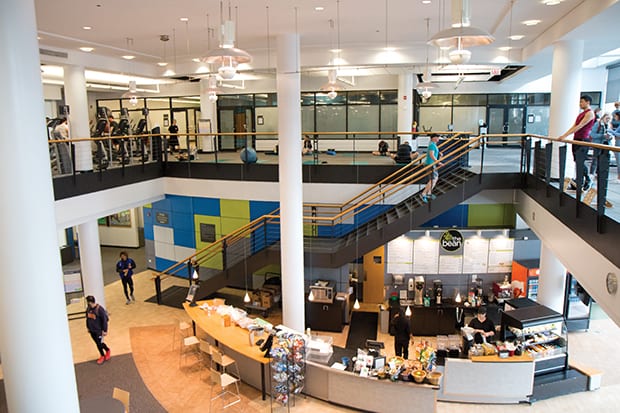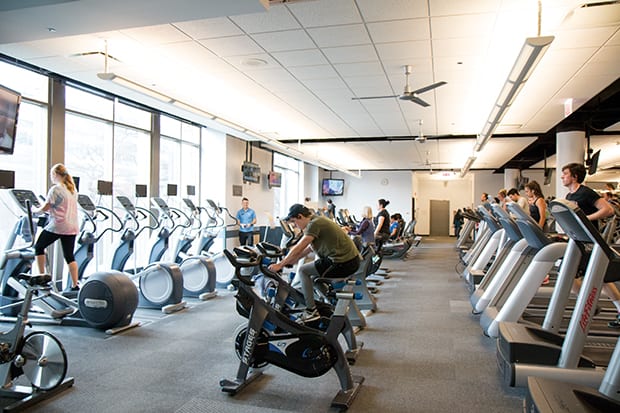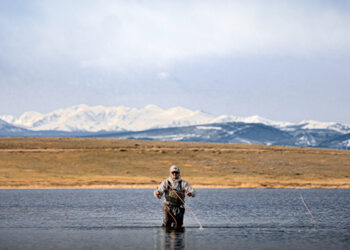Students leaving the DePaul University rec center may have the typical “fitness” items in their hands — water bottles, gym bags or headphones.
But, they also could have a potted plant or self-decorated canvas bags, created in what’s know as Do-it-Yourself (DIY) workshops.
“We wanted to start offering some low-key recreational activities that had very few barriers to participation,” said Maureen McGonagle, the director of campus recreation at DePaul University in Chicago, Illinois. “We started looking at the data, asking who’s coming in the building? And who’s not coming in the building? And why aren’t they coming in the building? Sometimes they’re not coming in the building because they’re intimidated.”
Lowering that barrier and reaching a new population was a big goal of DePaul. And the workshops have been a hit. “The students are learning something, they’re meeting new people and they feel a connection to the university they might not have had before,” said McGonagle.
Sarah Hardin, the associate director of wellness services and initiatives, explained when choosing workshop topics, they try to keep the classes fairly simple and no longer than an hour in length. Plus, she said most projects often cost $100 or less to put on, and a lot of the items can be reused. Often, it’s simply finding out what the students want, whether that’s asking or treating the classes like trial runs.

But it goes beyond just having students create their own aromatherapy spray bottles. McGonagle said they also get creative with on-campus partnerships. For example, the rec center works with the university’s urban farm, allowing students to come in and sell produce they grew themselves. Like Hardin, McGonagle said they want to look past just physical wellness.
While the DIY classes are a bit of a newer implementation, what’s not new is the building itself. However, Hardin said they often get surprised reactions when they tell people the facility is 19 years old. While she gave huge kudos to the campus facility operations team for keeping the building looking new, Hardin also mentioned the students.
“We’ll usually close down for two or three days [a year]. We actually get a team of students in here and while the facility operations people are coming in and fixing things and doing high dusting, we clean every single piece of our equipment and we do all the corners and above the doors,” she said. “It gives them a little ownership of the building; it gives them a little indication of what goes into keeping a place looking this good.”

Change it seems is a theme at DePaul, especially when it comes to the staff, but not in the way you think. Something that makes the university different from the rest is the Bucket Exercise, and it has all to do with roles within the department.
It goes something like this: A position opens up in campus recreation. McGonagle then sends out an email to every member of the team. “I email the staff and ask, ‘Imagine your job is a bucket, and in the bucket are all these little pieces of paper that have all your job responsibilities listed. If you had full authority to take out and put in anything you want, what are those things?’” she explained.
The Bucket Exercise has impacted many of DePaul’s staff. John Washo, the associate director of programs, began as the assistant director of intramural, club sports and special events. As the years passed, Washo would give up and take on various departments. Whether it was letting go of club sports and adding outdoor adventure, or dropping facility rentals and picking up aquatics, his path at DePaul has been a winding one.

Washo shared he never expected to be at a place for as long as he’s been at DePaul. And the Bucket Exercise has made longevity a more typical thing in DePaul’s campus rec department. “I think we’ve had people who stay in the assistant director role a little bit longer than at some other universities because they’re continuing to be challenged, they are still supported, they feel like they are growing their skillset, they are not getting bored,” he said. “It also shows how much we value them because we’ll trust them with doing new things they previously didn’t have any experience with.”
There have been several times McGonagle has been surprised by Bucket Exercise requests. Oftentimes she hasn’t known a staff member is interested in a certain program area until the email goes around. For example, Washo didn’t have lifeguard experience when he voiced interest in taking over the aquatics program. Another staff member who was involved in entrance attendance and lifeguards said she was interested in instructional/specialty programming. So when an opening came up, McGonagle moved that program under her.

While the size of their program and being a CENTERS campus – a company that provides management services for campus recreation facilities – has made the ability to implement the Bucket Exercise a little easier, Washo suggested other universities should find ways to develop similar availabilities for their staff. “It’s been a great opportunity, a great experience with a fantastic staff and I’ve enjoyed it,” said Washo. “They’ve given me opportunities to shift around what I’ve been doing over the years; it’s definitely kept it engaging, challenging and fun.”
Because in the end, the Bucket Exercise comes back to the mentality McGonagle preaches: The best way to ensure you succeed is by focusing on others. By building up the team, DePaul succeeds as a whole. “If people spent a little more time prioritizing people around them … it ends up paying dividends,” she said. “I think a very large part of my job is about creating the conditions for my staff to be successful and happy. I know it sounds a little trite to say I’m prioritizing my staff’s happiness, but the truth is if they feel challenged, respected and supported they’re going to do better work, and if they do better work, we’re doing a better job of achieving our mission.”













